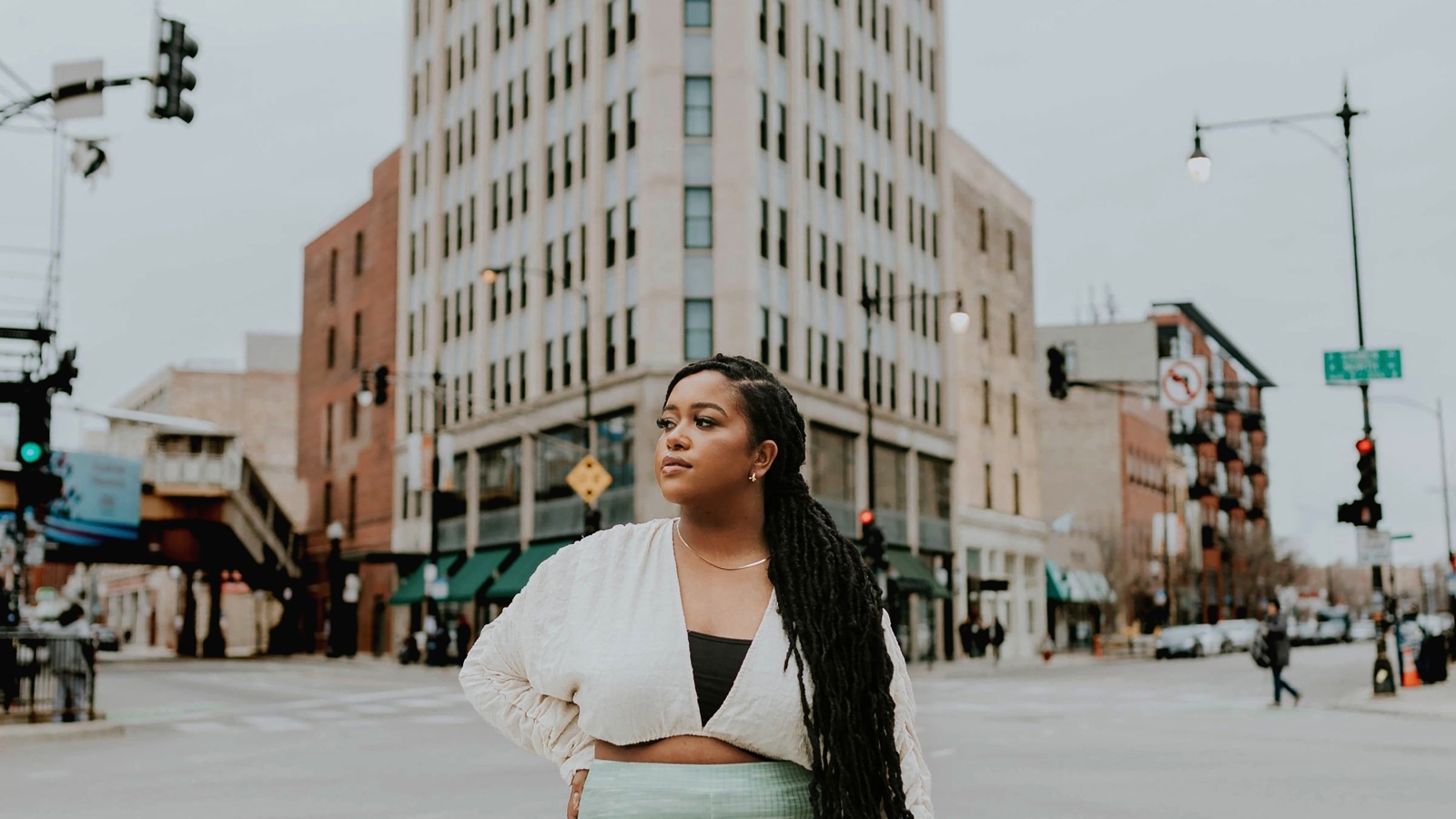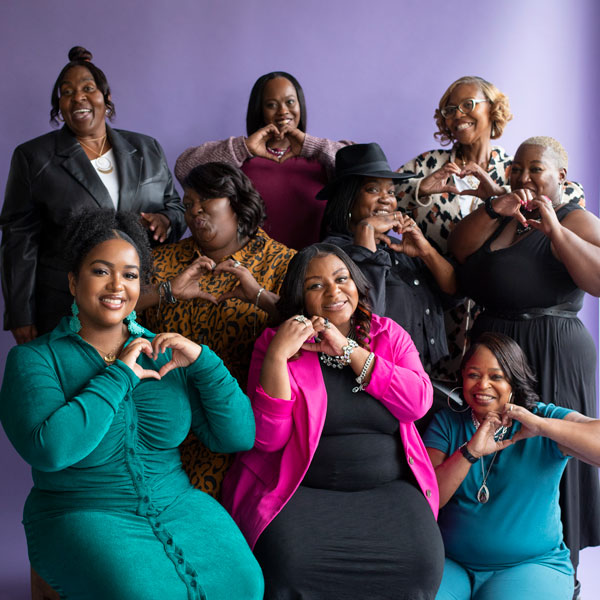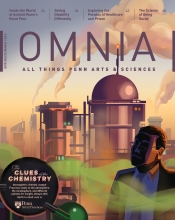Root of the Matter
Human rights advocate Eva Maria Lewis, C’21, seeks to address root causes of gun violence through investment and empowerment.

Eva Maria Lewis, C’21, awakened to the disparities within her hometown of Chicago at a young age. On long commutes from her neighborhood of South Shore—a community affected by gun violence and systemic issues like disinvestment—to her school on the North Side, she realized how different her life might have looked. As a junior in high school, she founded Free Root Operation (FRO), a nonprofit focused on combatting gun violence in Chicago’s Black and Brown communities. Throughout her time at Penn, the organization’s influence continued to grow.
With her degree in sociology and funding from the 2021 Reebok Human Rights Award, Lewis is accelerating her on-the-ground efforts to create opportunity and provide resources. “I approach the work from a place that’s less charitable and more symbiotic,” she says. “Because in freeing some of these people, I’m freeing myself.”
What motivated you to start your own nonprofit?
From kindergarten on, I had to go outside of my neighborhood to get an equitable education. For high school, I tested into Walter Payton College Prep. That was my first time on the North Side of Chicago. I didn’t know there were areas of the city that were strong communities with modern infrastructure and resources.
The first protest I attended was a youth march after Trayvon Martin was killed. Especially for Black young people, that was the moment we realized that what we were learning in our history books was actually the present; we weren’t so removed from the Civil Rights movement.
I went into high school with that lens, paired with my observations about the stark differences between my community and the community where I was being educated, as well as educators’ inability to exercise equity when it comes to students dealing with barriers like poverty. I started being active through a coalition, Youth for Black Lives. I started to wonder what it would look like for our communities to be equitable.
How did you build momentum?
It was just blessings because people were bringing my name up. One of my gifts is public speaking and getting people to understand things that they usually don’t understand. Coming from a community affected by poverty-induced gun violence, I talked about it in a way that rallied people to shift their thinking from mediating gun violence through policy alone to root causes. I had a viral TED Talk during my first year at Penn, and I’ve used the power of social media.
After years in organizing and activism, I was blessed to have the budget to gain 501(c)(3) status for FRO in 2020. With that status and my first employees, I had a lot more support and access to resources. We got to work and found our footing.
How did you integrate your studies at Penn with your work in Chicago?
I was a bit of a menace. Some people questioned how I would succeed if I continued to care about my community. But there were angels at Penn, especially in the sociology department and Kelly Writers House, who invested in me because they saw the validity in my work.
In doing sociology literature reviews, I couldn’t find much information about gun violence, which was a limitation. I wanted to build out that information. I started the first community needs and assets assessment for my neighborhood, talking to 500-plus people about what they wanted South Shore to look like. I worked with Penn professors, in particular professor Regina Baker, to analyze and synthesize this data through my coursework. We were surprised to find that one of the things people cared about the most was incorporating leisure into the community.
FRO launched the BLOOM cohort in 2022. Tell us about the program.
BLOOM addresses gun violence through investment rather than through policing and governmental public safety infrastructure. The program leads Black women, particularly single mothers, through a six-month journey where they learn about self-care, nourishment, and transformation. We pair them with a social worker who helps them learn how to set and attain goals. To graduate from the program, they have to have attained a goal.
Why single mothers?
BLOOM came from my own experience as the daughter of a single mother, along with the merging of my academic career with my community work career. During the uprisings of 2020, we started the Chicago Food Pairing Program. All of the grocery stores on the South and West Sides were closed, so we paired people up north and in the suburbs to grocery shop for families in our communities. We serviced 543 heads of households, and we could count on our hands how many were men. It was mostly Black single mothers. We felt a need to directly respond.
How did BLOOM come together?
People took a risk on us; when we first reached out, we were still figuring out an infrastructure. It went from zero to 100 so quick. Top restaurants donated full platters to feed these women at our events; we had everything from Jamaican food to Puerto Rican food to tapas. Brands, some of them Black-owned, donated luxury items for our graduation gift bags. We had people like Broadway In Chicago reach out to give us tickets, exposing these women to leisure experiences that they didn’t have access to because those were considered to be for people of a high class. As a result, the capacity of these women to dream and have self-agency and autonomy increased.
The event I was most proud of was an industry-level photo shoot for the ladies, where a photographer, celebrity stylist, makeup artists, and hair stylists donated their time. Seeing the ladies step out of their comfort zones in front of the cameras was awesome. That was the day when I said, “What we’re doing here is magical.”
Are you optimistic about the future? What is your hope for Chicago and other communities?
Resilience is a reason to be optimistic. My people, Black and Indigenous, are making so much progress to heal ourselves and find ways to invest in ourselves. That is a testament to our commitment to proceed, progress, grow, and make a home even though our home was stolen. Like Mariame Kaba says, “Hope is a discipline.”
My approach is to get people to dream, because I believe that colonialism stole our imagination and our ability to create infrastructures that replace those that don’t serve us. I want to see people living freely, being able to rest—especially single mothers. There is a plethora of Black single mothers in disenfranchised communities, but there are not resources to pour into them and to provide for them. I want them to be invested in instead of shamed and ignored. I want everyone to feel like they have an equitable path toward freedom that has nothing to do with adverse mechanisms of survival. I want us to move out of a scarcity mindset and into abundance.
Header image by Anna Jung-Hwa




